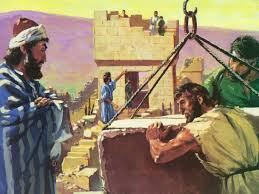David Provided the Resources
for Building the Temple
First Chronicles 29:1-9
David provided the resources for building the Temple DIG: How does David’s use of money become a model of loyalty? To what three things is David most loyal? To what top priorities are the people loyal? Do their hearts follow their money? Or vice-versa? Why? As Solomon was still young and inexperienced, where is David placing his faith and gifts: In missions? Bricks and mortar? People? Worship? Education? Something else?
REFLECT: How does David’s fundraising strategy rate against all the financial appeals you receive? If outside auditors were to look over your check-book, what would they conclude about your top loyalties? How would you like to change that?
970 BC
David had summoned all the officials of Isra’el to assemble at Jerusalem (First Chronicles 28:1). The opening words are actually a continuation of the previous address, and therefore, the subject of building the Temple is implicitly understood. Then turning to the assembled crowd, King David said: My son Solomon, the one whom God has chosen, is young and inexperienced. The task is great, because this palatial structure is not for man but for ADONAI, God. Therefore, it was the duty of the people to erect an edifice that in its splendor would be worthy of Him. With all my resources I have provided for the Temple of my God – gold for the gold work, silver for the silver work, bronze for the bronze, iron for the iron and wood for the wood, as well as onyx for the settings, turquoise, stones of various colors, and all kinds of fine stone and marble – all of these in large quantities (First Chronicles 29:1-2).

David announced that, in addition to the materials he had collected for the Temple from his conquest of other nations, and from various other sources, he was donating a substantial part of his own fortune, because of his love for God and His house. Besides, in my devotion to the Temple of my God I now give my personal treasures of gold and silver for the Temple of my God, over and above everything I have provided for this holy Temple: three thousand talents of gold (gold of Ophir) and seven thousand talents of refined silver, for the overlaying of the walls of the buildings, for the gold work and the silver work, and for all the work to be done by the craftsmen. Now, who is willing to consecrate themselves to the LORD today” (First Chronicles 29:3-5)?
Then the leaders of families, the officials of the tribes of Isra’el, the commanders of thousands and commanders of hundreds, and the officials in charge of the king’s work gave willingly. They gave toward the work on the Temple of God five thousand talents and ten thousand darics (a Persian gold coin) of gold, ten thousand talents of silver, eighteen thousand talents of bronze and a hundred thousand talents of iron. Anyone who had precious stones gave them to the treasury of the Temple of YHVH in the custody of Jehiel the Gershonite (to see link click Ez – Treasurers and Judges of the Temple). The people rejoiced at the willing response of their leaders, for they have given freely and wholeheartedly to the LORD. David the king also rejoiced greatly (1 Chron 29:6-9).
It’s time to remember Rabbi Sha’ul’s words: And now brothers and sisters, we must tell you about the grace God has given to the congregations in Macedonia. Despite severe trials, and even though they are desperately poor, their joy has overflowed in a wealth of generosity. I tell you they have not merely given according to their means, but of their own free will they have given beyond their means. They begged and pleaded with us for the privilege of sharing in this service for God’s people. Also, they didn’t do this in the way we have expected, but first they gave themselves to the Lord, which means, by God’s will, to us. Here’s the point, everyone should give according to what they have decided in their heart, not grudgingly or under compulsion, for God loves a cheerful giver (Second Corinthians 8:1-5 and 9:7).



Leave A Comment